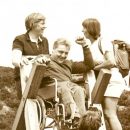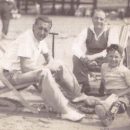World War Two
Ronald Leedham: Incendiaries in the park
Ronald Leedham was born in 1929 in India. His family moved back to England in 1931after Ronald contracted Polio. Ronald spent some years in Hospital as a young child after contracting Diptheria. When he was six he returned home to Catford for a short while to live with his father, eventually ending up living in ‘homes for crippled children’ run by the Shaftesbury Society, until he was sixteen.
More from
Ronald Leedham
- Awful Sundays
- Suitcases
- Shelter
- Oliver Twist
- Explosives
- Visits
- No talking
- Sheltering in the Church
- Certificates
- War starts
- The Walk to Church on Sunday
- Boys and girls together
- Beatings
- Shame
- Oliver Twist and donk
- Greyness
- Lead Soldiers
- Parlour Songs
- ‘Mummy coming’
- Dogfight
- I Knew Nothing About Life
- Buzz Bombs and Doodlebugs
- Mum
- Difficult subject
- Cricket at Sevenoaks
- Shut Away and Tipped Out
- Geography
- A Miserable Time
- Visiting every six weeks
- Home
- The Glow over London
Here Ron describes finding bombs in the park.
Transcript
We used to go for long walks in Knole Park. We did a lot of walking, us kids, unbelievable. Those of us that could, we got taken out in Knole Park, roaming over the hills and over the trees, all birch, all beech trees they were, magnificent. The right time of year the place was full of nuts. There were sweet chestnuts and we used whole bags of sweet chestnuts and walking up to the old house, Knole House with all the horse chestnuts around it. There were some ponds there where we used to catch newts and things like that, you know, tadpoles, there were lots of deer. And I can remember one day there’d been an air raid the night before and we went in, on the Saturday night, there’d been an air raid and we could remember cos when possible we always used to look out of the windows, we had blackout but we used to get up behind the blackout. We weren’t supposed to and bloody dangerous actually, although the windows were taped up, you know, the glass could have shattered. and I remember one night we saw this great big white glow in the sky over Knole Park and we went over in that direction the next day and we found there was a great field, like a big playing field, it was a big flat area, big grassed area and it had taken a full load of incendiaries. And they were.. the ground was white with the phosphorus where it had burnt and there were all these tail fins of the incendiary bombs. An incendiary bomb is about that big and about that round and there were all these tail fins sticking up out of these burnt holes in the ground. There were hundreds and hundreds of them and some of them hadn’t gone off and so we were picking these unexploded incendiary bombs up and looking at them and putting them back down again. But, yes Sunday afternoons could be quite good, when it was dry. When it was wet, of course, we had to read and all that sort of thing.Explore more
Explore stories by theme or view the timeline of significant events in education for disabled people
![How Was School? [logo]](https://howwasschool.allfie.org.uk/wp-content/themes/hws-base-theme/assets/img/allfie-logo-original.svg)



